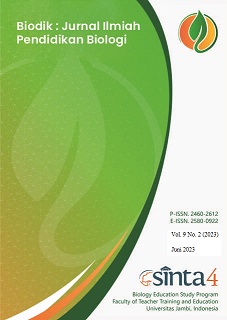Peningkatan Hasil Belajar Biologi Siswa dengan Model STAD Pada Konsep Jaringan Tumbuhan
(Improving Students' Biology Learning Outcomes with the STAD Model on the Concept of Plant Tissue)
DOI:
https://doi.org/10.22437/biodik.v9i2.19807Abstract
In a teaching and learning process, apart from the teacher, there are two very important elements, namely teaching methods and learning media. Learning has several models or learning approaches, one of which is cooperative learning. Cooperative learning is a learning approach that focuses on using small groups of students to work together and maximize learning conditions to achieve learning objectives. Student teams achievement division (STAD) learning is a type of cooperative learning that emphasizes interaction between students to motivate each other and help each other in mastering the material and achieving maximum achievement. This study aims to determine the improvement of students' biology learning outcomes with the stad type cooperative learning model on the concept of plant tissue. This research method is literature review. Literature review is a literature search and research by reading various books, journals, and other publications related to the research topic, to produce an article related to a particular topic. Based on the above discussion, it is concluded that the use of the STAD type cooperative learning model has a significant effect on improving student biology learning outcomes on the concept of plant tissue.
Key words: Education, Learning, Cooperative, and STAD
Â
ABSTRAK
Proses belajar mengajar, selain guru ada dua unsur yang amat penting yaitu metode mengajar dan media pembelajaran. Pembelajaran memiliki beberapa model atau pendekatan pembelajaran, salah satunya adalah pembelajaran kooperatif. Pembelajaran kooperatif merupakan suatu pendekatan pembelajaran yang berfokus pada penggunaan kelompok kecil siswa untuk bekerja sama dan memaksimalkan kondisi belajar untuk mencapai tujuan belajar. Pembelajaran student teams achievement division (STAD) merupakan salah satu tipe pembelajaran kooperatif yang menekankan interaksi diantara siswa untuk saling memotivasi dan saling membantu dalam menguasai materi dan mencapai prestasi secara maksimal. Penelitian kali ini bertujuan untuk mengetahui peningkatan hasil belajar biologi siswa dengan model pembelajaran kooperatif tipe stad pada konsep jaringan tumbuhan. Metode penelitian ini adalah literature review. Literature review adalah suatu penelusuran dan penelitian kepustakaan dengan membaca berbagai buku, jurnal, dan terbitan-terbitan lain yang berikaitan dengan topik penelitian, untuk menghasilkan suatu tulisan yang berkenaan dengan suatu topik tertentu. Berdasarkan pembahasan diatas, disimpulkan bahwa penggunaan model pembelajaran kooperatif tipe STAD berpengaruh signifikan terhadap peningkatan hasil belajar biologi siswa pada konsep jaringan tumbuhan.
Kata kunci: Pendidikan, Pembelajaran, Koopertaif, STAD
Downloads
References
Kunandar. (2007). Guru Profesional : Implementasi Kurikulum Tingkat Satuan Pendidikan (KTSP) dan Sukses dalam Sertifikasi Guru. Jakarta : Rajagrafindo Persada.
Marzali, A. (2016). Menulis Kajian Literatur: Jurnal Etnosia, 1(2): 27-36.
Nawawi, M., dan Jumriani, S. (2022). Pengaruh Penggunaan Media Pengajaran Visual Pada Model Pembelajaran Kooperatif Tipe STAD Terhadap Aktivitas dan Hasil Belajar Siswa Kelas XI SMA; Journal of Biology Education, 4(1): 13-23.
Nurhayati dan Sappe, W,L. (2012). Strategi Belajar Mengajar. Jurusan Biologi FMIPA UNM. Makassar.
Purwanto. (2009). Evaluasi Hasil Belajar, Yogyakarta. Pustaka Pelajar.
Riyadi, N., Meti, I., dan Bowo, S. (2015). Peningkatan Hasil Belajar Biologi dengan Penerapan Model Kooperatif Tipe STAD pada Siswa Kelas X-F SMA Negeri 1 Tangen Sragen Tahun Pelajaran 2013/2014. Surakarta. Fakultas Keguruan dan Ilmu Pendidikan Universitas Sebelas Maret.
Rusman. (2018). Model-model Pembelajaran. Depok: Raja Grafimdo Persada.
Rustaman, N & Rustaman A. (2001) Keterampilan Bertanya dalam Pembelajaran IPA. Dalam Hand Out Bahan Pelatihan Guru-guru IPA SLTP Se Kota Bandung di PPG IPA. Depdiknas.
Sanjaya, Wina. (2012). Strategi Pembelajaran Berorientasi Standar Proses Pendidikan.Jakarta: Kencana.
Sari, Y. (2019). Meningkatkan Hasil Belajar Biologi dengan menggunakan Model Pembelajaran Kooperatif Tipe Student Team Achievent Divisions (STAD) di Sekolah Menengah Atas Negeri 7 Batang Hari. Jambi. Fakultas Tarbiyah dan Keguruan Universitas Islam Negeri Sulthan Thaha Saifuddin.
Slavin, Robert E. (2015). Cooperative Learning. Bandung. Nusa Media.
Soewarso. (1998). Menggunakan stretegi Komperatif Learning di dalam pendidikan Ilmu Pengetahuan Sosial: Edukasi.
Yulistyawati, E. (2014). Peningkatan Hasil Belajar Biologi Siswa dengan Model Pembelajaran Kooperatif Tipe STAD pada Konsep Jaringan Tumbuhan. Jakarta. Fakultas Ilmu Tarbiyah dan Keguruan Universitas Islam Negeri Syarif Hidayatullah.
Zanuar. (2010). Simetri Lipat dan Simetri Putar. Tersedia di http://forum.upi.edu/. Diunduh pada tanggal 20 Meit 2014 pukul 13.00.
Downloads
Published
How to Cite
Issue
Section
License
Copyright (c) 2023 Rahmi Fitri Yusri, Siti Nurhalijah, Pricillia Humaira, Putri Fatmaya, Suci Novany, Annisa Purba

This work is licensed under a Creative Commons Attribution-NonCommercial-ShareAlike 4.0 International License.
Copyright Notice
Authors who publish with Biodik : Jurnal Ilmiah Pendidikan Biologi agree to the following terms:
- For all articles published in Biodik : Jurnal Ilmiah Pendidikan Biologi, copyright is retained by the authors and grant the journal right of first publication with the work simultaneously licensed under a Creative Commons Attribution-ShareAlike 4.0 International Licensethat allows others to share the work with an acknowledgment of the work's authorship and initial publication in this journal.
- Authors are able to enter into separate, additional contractual arrangements for the non-exclusive distribution of the journal's published version of the work (e.g., post it to an institutional repository or publish it in a book), with an acknowledgment of its initial publication in this journal.
- Authors are permitted and encouraged to post their work online (e.g., in institutional repositories or on their website) prior to and during the submission process, as it can lead to productive exchanges, as well as earlier and greater citation of published work (See The Effect of Open Access).
















